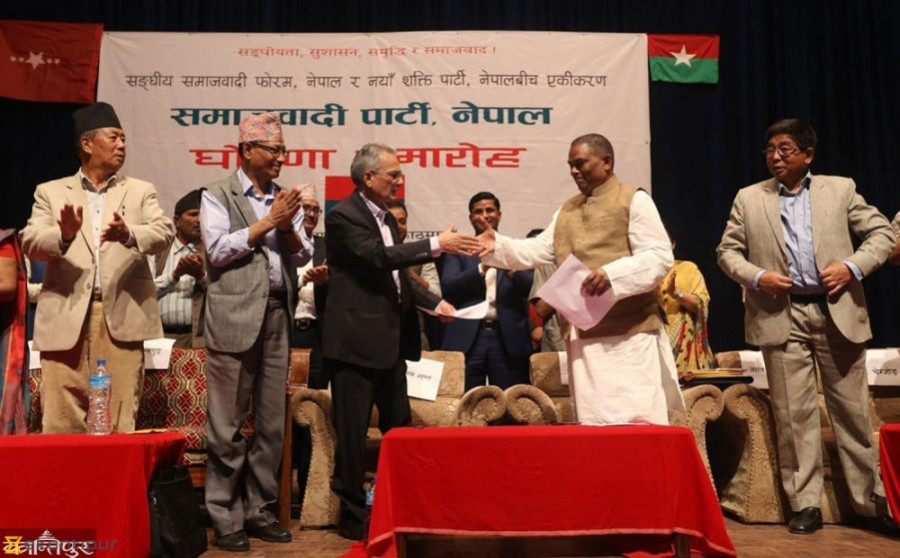Politics
Samajbadi Party mulls quitting government to make a fresh push for constitution amendment
Leaders say they have waited for too long but the Oli Cabinet has taken no steps to address their demand
Tika R Pradhan
Thirteen months ago, Upendra Yadav had, on behalf of his party, then known as Sanghiya Samajbadi Forum-Nepal, reached a two-point deal with Prime Minister KP Sharma Oli and then-Maoist chairman Pushpa Kamal Dahal.
The deal was a precondition for Yadav’s party to joining the Oli government—that the constitution would be amended “through consensus”.
But with the Oli government showing no signs of amending the charter, Yadav’s party, now known as Samajbadi Party Nepal after its merger with the Naya Shakti Nepal, is planning to pull out of the Oli government.
“We are preparing to hold a final discussion with the prime minister. We want to know whether he is still keen to abide by the agreement,” Yadav told the Post.
Party insiders say Yadav is under pressure, especially after the formation of the Samajbadi Party Nepal, in which he chairs the central executive committee, while another Chairman Baburam Bhattarai leads the federal council.
One of the main objectives of the merger between the Forum and Naya Shakti was to create pressure on the government to amend the constitution and build an alternative political force in the country.
It has been almost two months since the formation of the Samajbadi Party, but it has neither quit the government nor has taken concrete steps for constitution amendment.
The last time they demanded constitutional amendments was on January 5.
“One of the main objectives of the merger was ensuring an amendment to the constitution for its proper implementation,” said Ganga Shrestha, general secretary of the Samajbadi Party.
Yadav and Bhattarai had decided to merge their parties because both of them believe that the constitution needs to be amended.
Bhattarai had quit the Maoist party 11 days after the promulgation of the constitution in 2015 in quest of forming a new alternative force in the country. The Constituent Assembly had promulgated the constitution on September 20 that year, despite opposition from some Madhes-based parties, including Yadav’s, who said its provisions marginalised some sections of society.
The first amendment was made on January 23, 2016, but the Madhes-based parties and indigenous groups said it was too little, too late.
Now, after more than a year in government, Yadav’s party wants to make a fresh push for constitution amendment.
“[Our] party has decided to seek time from the prime minister to discuss the constitution amendment issue,” Rajendra Shrestha, co-chairman of the Samajbadi Party, told the Post. “A team of senior leaders, including Bhattarai, will soon meet the prime minister.”
The Samajbadi Party is also in talks with the Rastriya Janata Party-Nepal, another Madhes-based party which is also demanding an amendment to the constitution.
The Rastriya Janata Party withdrew its support to the government in March, after the Kailali District Court convicted one of its lawmakers—Resham Chaudhary—of inciting the Tikapur violence of August 2015 and sentenced him to life in prison.
Leaders said informal talks are going on between the two parties for forging a working alliance—or even merger—so that they together can press the government to amend the constitution.
The Rastriya Janata Party, however, wants the Samajbadi Party to quit the government if merger talks were to be taken forward.
Political analysts say chances of an amendment to the constitution by the current government are slim unless the parties demanding an amendment come together and build a strong force.
“I don’t see any possibility of an amendment from this Parliament as the [ruling] Nepal Communist Party is not ready for it,” said Vijay Kant Karna, a professor of political science and analyst. “Yadav himself was not convinced that Oli would amend the constitution when he joined the government,” Karna told the Post. “But if Yadav really wants to build pressure, his party should join hands with the Rastriya Janata Party and other like-minded forces.”
A majority of the Samajbadi Party leaders are also in favour of quitting the government, as they believe the longer they stay, the more are the chances of their demand of constitution amendment getting diluted.
“We have not decided the date [for quitting the government], but we cannot wait anymore,” said Ganga Shrestha.
According to him, the Samajbadi Party is currently busy with the formation of the district and provincial committees.
“Most probably we will come up with a concrete and bold decision about our relationship with the government after a meeting of the central executive committee,” Ganga Shrestha told the Post.
According to Karna, the political analyst, the parties that want constitution amendment, must unite now. “If they want the government to listen to them,” said Karna, “they have no option than to start protests from the streets.




 12.62°C Kathmandu
12.62°C Kathmandu















